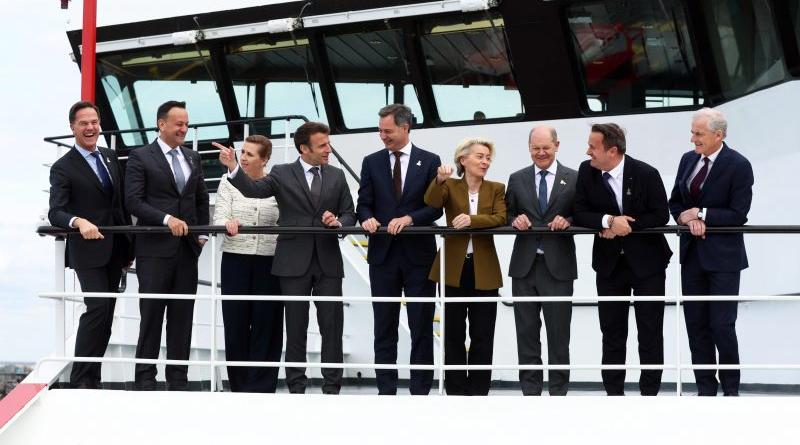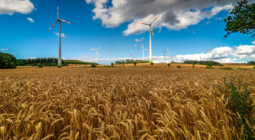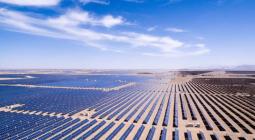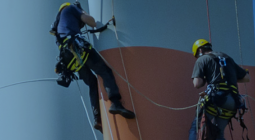North Sea countries aim for 300 GW of offshore wind energy by 2050

Nine European countries signed the Ostend Declaration on Monday (24 April), aiming to jointly produce at least 120 gigawatts of offshore wind energy by 2030 and at least 300 gigawatts by 2050 in the North Sea.
The declaration, which follows a goal of producing 150 gigawatts (GW) of power in the North Sea by 2050 set by Belgium, Denmark, Germany and the Netherlands last year, doubles the previous ambition and brings five more countries on board.
At a press conference ahead of the signing, Belgian Prime Minister Alexander De Croo called the summit a “milestone” and welcomed the new countries – Ireland, France, Luxembourg, the Netherlands, Norway and the UK – on board.
In the face of the climate crisis, “Our goal is to deliver a greener Europe, a Europe which is energy independent,” De Croo told journalists.
These are big targets, said Simone Tagliapietra from the economic think-tank Bruegel, noting the EU has 200GW of installed wind capacity, only 15GW of which is offshore.
Strengthening European energy security
In response to Russia’s “energy blackmail”, the nine countries will also reduce their fossil fuel consumption and dependence on imports, the declaration said.
“We have to make sure Putin no longer has the means to exert pressure on us by turning off the gas tap, and producing clean energy is the best way to achieve this,” said Dutch Prime Minister Mark Rutte, who added that “the enormous potential of the North Sea region is indispensable here”.
“More green energy will strengthen our energy security as Europeans and, of course, also provide reliable energy prices for our households and for our businesses,” said Danish Prime Minister Mette Frederiksen.
Irish Taoiseach Leo Varadkar highlighted the need to develop wind energy in answer to climate change. “We have no time to waste in acting, and we have to be the generation that turns the tide on climate change and biodiversity [loss],” he added.
The declaration also looks beyond the North Sea to the Atlantic Ocean, Celtic Sea and Irish Sea, saying that the countries will “further endeavour to accelerate deployment of offshore renewables and connectivity” in these areas.
Ireland has a vast potential for offshore wind, with sea space seven times greater than its land mass, according to Varadkar, who wants to work with regional partners to develop offshore grids and power connections to “benefit us all”.
Alongside wind projects, the declaration looks at “the development of a well-functioning market and infrastructure for hydrogen”.
Green hydrogen – produced using renewable electricity to split water molecules – could help transfer energy from areas with lots of production, like those that have offshore wind, to other parts of Europe.
“The North Sea is a place where a lot of energy can be generated for the future,” said German Chancellor Olaf Scholz.
Promoting European industry
Meanwhile, French President Emmanuel Macron emphasised the role of European industry, pointing to France’s €40 billion plan to develop 40 GW of wind power by 2050, creating 20,000 jobs.
However, Macron warned against repeating the mistakes that led Europe to lose its solar industry to China. The wind industry in Europe is struggling, with its five wind turbine manufacturers all operating at a loss in 2022.
According to industry group WindEurope, this is due to slow permitting, supply chain problems, international competition and poorly designed auctions driving a race to the bottom.
“In 2022 not a single large-scale offshore wind farm reached a final investment decision in Europe,” Tagliapietra commented. Without policy support, the targets might well remain on paper, he warned, calling for the construction of a North Sea “super grid” to connect countries in the region.
Dutch PM Rutte echoed calls from Scholz to improve the permitting issues faced by the wind industry. He also told journalists that Europe needs to be “less dependent on one single supplier for our critical raw materials,” a reference to China.
Europe is heavily reliant on Beijing for the rare earths needed to manufacture the powerful magnets mounted in wind turbines, raising concerns that the EU could replace its dependence on Russia with one on China.
Security concerns
European leaders also addressed concerns about the security of offshore energy infrastructure, following the sabotage of the Russian Nord Stream gas pipelines last year.
Responding to a press question about security of offshore energy infrastructure, De Croo said that new projects need to include “security by design”.
Meanwhile, European Commission President Ursula von der Leyen said that Brussels is following the situation “very closely because we know that our critical infrastructure is under threat”. The European Union has stepped up its preparedness and is working with NATO on the security of its infrastructure, she added.
An investigation into the sabotage is underway and the Danish prime minister said that authorities are not yet able to discuss it as it has not been concluded.
[Edited by Frédéric Simon/Alice Taylor]
cover photo: European leaders met in Belgium for the second North Sea Summit to push for a quicker rollout of offshore wind [Olivier Hoslet / EPA-EFE]






